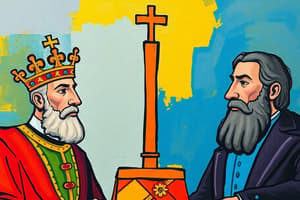Podcast
Questions and Answers
What best describes a state in political terminology?
What best describes a state in political terminology?
- A representation of only those in power.
- An ideological perspective on governance.
- A temporary governance structure.
- A more extensive entity encompassing institutions and citizens. (correct)
Which of the following is a key distinction between a state and government?
Which of the following is a key distinction between a state and government?
- The government represents the interests of society.
- The state exercises impersonal authority. (correct)
- Both are permanent entities.
- The state can change from time to time.
Which type of government is characterized as corrupt under Aristotle's framework?
Which type of government is characterized as corrupt under Aristotle's framework?
- Polity
- Oligarchy (correct)
- Democracy
- Monarchy
What is a significant threat to the nation-state as indicated in the content?
What is a significant threat to the nation-state as indicated in the content?
What are the main characteristics associated with economic globalization?
What are the main characteristics associated with economic globalization?
How is a nation typically defined in a political context?
How is a nation typically defined in a political context?
Which describes a key aspect of a failed state?
Which describes a key aspect of a failed state?
What concept refers to the people’s perception that their government rules rightfully and must be obeyed?
What concept refers to the people’s perception that their government rules rightfully and must be obeyed?
What does the term 'McDonaldization' refer to in the context of globalization?
What does the term 'McDonaldization' refer to in the context of globalization?
Which type of power is defined as the influence on the content of decisions made?
Which type of power is defined as the influence on the content of decisions made?
Which type of authority is based on acceptance of traditional practices?
Which type of authority is based on acceptance of traditional practices?
What element of the state is characterized by the ability to exercise authority over its territory and people?
What element of the state is characterized by the ability to exercise authority over its territory and people?
What term describes a form of power that involves controlling the political agenda by highlighting specific issues?
What term describes a form of power that involves controlling the political agenda by highlighting specific issues?
Which of the following types of authority relies on the exceptional personal qualities of a leader?
Which of the following types of authority relies on the exceptional personal qualities of a leader?
Which type of state exercises jurisdiction over its entire territory effectively and ensures laws are mostly obeyed?
Which type of state exercises jurisdiction over its entire territory effectively and ensures laws are mostly obeyed?
What is the primary function of the government within a state?
What is the primary function of the government within a state?
Flashcards are hidden until you start studying
Study Notes
Understanding Power
- Power allows individuals to influence others' thoughts or behaviors against their will.
- It signifies the capability to accomplish objectives and compel actions from others.
Political Power Concepts
- Legitimacy: Perception that a government has the rightful authority to rule, necessitating obedience from the populace.
- Sovereignty: National government's exclusive authority and independence within its territory.
- Authority: The respect and control exercised by political leaders.
Dimensions of Power
- Decision-making: Power relates to influencing decisions regarding what issues are prioritized and how they are addressed.
- Agenda setting: Involves controlling which issues are highlighted in political discourse, marginalizing other topics.
- Thought control: Encompasses ideological indoctrination where an individual shapes another's thoughts or behaviors.
Types of Authority
- Traditional: Rooted in customs and heritage, exemplified by monarchies.
- Rational-legal: Based on established laws and formal regulations, demanding compliance through legitimate commands.
- Charismatic: Derives from the exceptional personal attributes of a leader that elicit loyalty.
Elements of the State
- Sovereignty:
- Jurisdiction: Ability of the state to exert control over its geographical area and inhabitants.
- Independence: The state’s ability to operate free from external interference.
- Government: The mechanism through which the will of the people is articulated and enforced.
- Territory: The physical space, including land, sea, and airspace, under a state's authority.
- People: The citizenry that comprises a political community.
Types of State
- Effective State:
- Maintains control over its territory, ensuring law obedience and providing security with minimal corruption.
- Weak State:
- Struggles against lawlessness and corruption, leading to rigged elections and misappropriated revenues.
- Failed State:
- Characterized by the absence of a functioning national government, rule by armed factions, and a decline in public services.
Aristotle’s 6 Types of Government
- Monarchy → Tyranny
- Aristocracy → Oligarchy
- Polity → Democracy
Key Distinctions Between State and Government
- Scope: The state encompasses all institutions and citizens; government is a part of the state executing authority.
- Duration: The state is a continuous entity; government can change frequently.
- Representation: The state aims for the common good; government often reflects the interests of those in power.
- Authority: The state operates impersonally through bureaucracy; government can show ideological bias.
Nation and Nation-State
- Nation: A collective identity formed through common language, history, traditions, and religion, often accompanied by shared emotions like patriotism.
- Nation-state: A political entity where state governance and national identity are intertwined, exemplified by cultural and political unity, as seen in the Philippines.
Globalization
- Recognized as a significant threat to nation-states, globalization connects societies, causing local events and decisions to have global repercussions.
Forms and Characteristics of Globalization
- Economic Globalization: Integrates economies into a unified global economy, facilitating international production and capital flow.
- Sociocultural Globalization: Diminishes cultural distinctions as information and goods are exchanged globally, illustrated by phenomena like "McDonaldization."
Studying That Suits You
Use AI to generate personalized quizzes and flashcards to suit your learning preferences.




